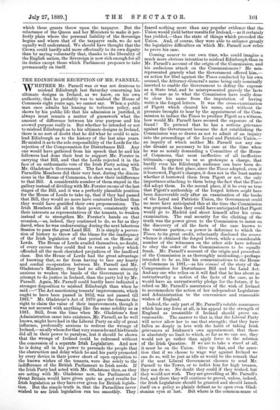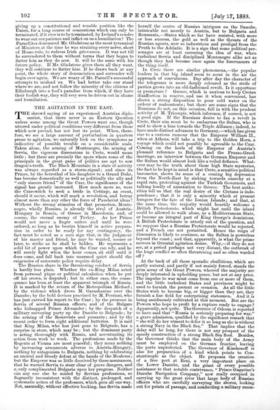THE EDINBURGH RECEPTION OF MR. PARNELL.
WHETHER Mr. Parnell was or was not desirous to mislead Edinburgh last Saturday concerning his ultimate designs in Ireland, as we know, on his own authority, that he probably was to mislead the House of Commons eight years ago, we cannot say. When a public man once admits his leaning to tortuous policy, and shows by his public life that his admission is justified, it always must remain a matter of guesswork what the amount of difference between his true purpose and his avowed purpose really is. But whether he intended or not to mislead Edinburgh as to his ultimate designs in Ireland, there is no sort of doubt that he did what he could to mis- lead Edinburgh as to the history of the last nine years. He misled it as to the sole responsibility of the Lords for the rejection of the Compensation for Disturbance Bill. Any one would have gathered from his speech that he and his followers had done their best to support Mr. Forster in carrying that Bill, and that the Lords rejected it in the face of an enthusiastic vote of the Irish Party acting with Mr. Gladstone's Government. The fact was not so. The Parnellite Members did. their very best, during the discus- sions in the House of Commons, to show their indifference to that Bill. A considerable number of them stayed in the gallery instead of dividing with Mr. Forster on one of the last stages of the Bill, and it was a perfectly plausible position for the House of Lords to take up, that if they had passed that Bill, they would no more have contented Ireland than they would have gratified their own prepossessions. The Irish Members did all in their power, consistently with their interests as representatives of the tenants, to weaken instead of to strengthen Mr. Forster's hands on that occasion,—as, indeed, they continued to do, so far as they dared, when he was endeavouring during the next laborious Session to pass the great Land Bill. It is simply a perver- sion of history to throw all the blame for the inadequacy of the Irish legislation of that period on the House of Lords. The House of Lords availed themselves, no doubt, of every excuse they could find to resist a policy which offended all the most cherished prejudices of the landlord class. But the House of Lords had the great advantage of knowing that, so far from having to face any hearty and cordial co-operation between Mr. Parnell and Mr. Gladstone's Ministry, they had no allies more sincerely anxious to weaken the hands of the Government in its attempt to do justice in Ireland, than the party led by Mr. Parnell. Again, Mr. Parnell could hardly have indicated a stronger disposition to mislead Edinburgh than when he said :—" The Act sanctioning tenants' improvements, which ought to have been passed in 1852, was not passed till 1881." Mr. Gladstone's Act of 1870 gave the tenants the right to claim the value of their improvements, though it was not secured with anything like the same solidity as in 1881. Still, from the time when Mr. Gladstone's first Administration came into existence, Mr. Parnell, as he well knows, might have had in the Liberal Party an ally of great influence, profoundly anxious to redress the wrongs of • Ireland,—an ally whom for that very reason he and his friends did all in their power to paralyse, lest it should be shown that the wrongs of Ireland could be redressed without the concession of a separate Irish Legislature. And now he is doing all in his power to persuade the people that the obstruction and delay which he and his party promoted by every device in their power short of open opposition to the known wishes of the tenants, were due solely to the indifference of the British Parliament to Irish needs. If the Irish Party had acted with Mr. Gladstone then, as they are acting with Mr. Gladstone now, the Parliament of Great Britain would have given quite as good results for Irish legislation as they have ever given for British legisla- tion. But the simple truth is, that the Parnellites never wished to see Irish legislation run too smoothly. They feared nothing more than any popular evidence that the Union would yield better results for Ireland,—as it certainly has yielded,—than the state of things which preceded the Union. And, of course, they were able to enhance greatly the legislative difficulties on which Mr. Parnell now relies to prove his case.
Coming nearer to our own time, who could imagine a much more obvious intention to mislead Edinburgh than in Mr. Parnell's account of the origin of the Commission, and his audacious attack on the Commissioners ? He mis- represented gravely what the Government offered him,— an action for libel against the Times conducted by his own counsel, the Attorney-General's name being only nominally inserted to enable the Government to defray the expense as a State trial, and he misrepresented gravely the facts of the case as to what the Commission have really done to clear his name from the imputation of having written the forged letters. It was the cross-examination of Pigott which cleared his name, and without the pressure brought to bear by the appointment of the Com- mission to induce the Times to produce Pigott as a witness, how would Mr. Parnell have secured the exposure of the fraud ? To pretend that he has a serious grievance against the Government because the Act establishing the Commission was so drawn as not to admit of an inquiry into the proceedings of the Loyal and Patriotic Union,— an inquiry of which neither Mr. Parnell nor any one else dreamt as necessary to his case at the time when he was so noisily demanding a Committee of the House of Commons, that most ineffective of all ineffective tribunals,—appears to us so grotesque a charge, that hardly even his Edinburgh audience can have been de- ceived. In the first place, since the Times adopted, even if it borrowed, Pigott's charges, it does not in the least matter whether it borrowed them from Pigott or not, the only importance attaching to them being the fact that the Times did adopt them. In the second place, if it be ever so true that Pigott's authorship of the forged letters might have been discoverable only after an examination of the books of the Loyal and Patriotic Union, the Government could no more have anticipated this at the time the Commission was proposed, than they could. have anticipated that Pigott would go to Madrid and shoot himself after his cross- examination. The real security for the eliciting of the truth was the power given to the Commission to insist on the discovery of all the facts of the case known to the various parties,—a power in deference to which the Times, to its great credit, reluctantly disclosed the source whence it obtained the forged letters, while a considerable number of the witnesses on the other side have refused to obey the order of the Commissioners to be equally frank.. Mr. Parnell's account of the origin and procedure of the Commission is as thoroughly misleading,—perhaps intended to be so, like his communications to the House of Commons in 1881,—as his résumé of the story of the Compensation for Disturbance Bill and the Land Act. And any one who relies on it will find that he has about as untrustworthy a notion of the facts of the case, as he would have an untrustworthy pledge for the future, if he relied on Mr. Parnell's assurances of the wish of Ireland to accommodate the action of her independent Legislature and Administration to the convenience and reasonable wishes of England.
Indeed, the only part of Mr. Parnell's voluble assurances which has any force at all, is his appeal to the strength of England as irresistible if Ireland should prove un- reasonable. The answer to that is, that the Liberal Party will never allow her to use that strength; that they have fallen so deeply in love with the habit of taking Irish grievances at Irishmen's own appraisement, that there is absolutely no limit to which, so far as we can see, they would not go rather than apply force to the solution of the Irish Question. If we are to take a stand at all, it must be on the Union. Give up that, and the asser- tion that if we choose to wage war against Ireland we can do so, will be just as idle as would be the remark that if the next Liberal Government chooses to send Mr.
Parnell to the Tower, or to indict him for high treason, they can do so. No doubt they could if they wished, but they would not wish. They are grovelling at Mr. Parnell's feet, and there they will continue to grovel, unless, indeed, the Irish Legislature should be granted and should launch itself on a policy so plainly defiant as to open even Glad- stonian eyes at last. But where is the common-sense of giving up a constitutional and tenable position like the -Union, for a long course of concessions which can only be terminated, if it ever is to be terminated, by Ireland's resolve -to wear out our patience and inflict on us a humiliation? The Parnellites denounced Mr. Gladstone as the most tyrannical of Ministers at the time he was straining every nerve, short of Home-rule, to redress Irish grievances. It was not till he surrendered to them without terms that they began to flatter him as they do now. It will be the same with his future policy. If Mr. Gladstone gives them all they want, they will continue to flatter him. If he draws back at any point, the whole story of denunciation and surrender will begin over again. We are weary of Mr. Parnell's successful attempts to mislead us. We had better take our stand where we are, and not follow the minority of the citizens of Edinburgh into a fool's paradise from which, if they have their foolish way, they will very soon be driven out in shame and humiliation.



































 Previous page
Previous page